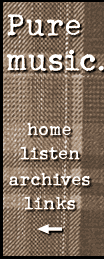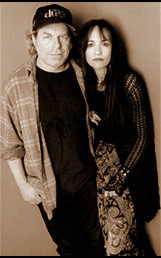 |
 |
 |
 |
 |
|
Puremusic Interview with Buddy and Julie Miller (continued)
PM: Buddy, what are those main axes that one sees you on stage with?
BM: I think the company was called Wandre. They've gotten released under a couple of different names, they're Italian, from the 60s. Wandre Pioli was the fella's name, I think. I believe he was into motorcycles and Picasso.
PM: So, a northern [German] Italian, I guess, if the "w" is pronounced like a "v"?
BM: Yeah, that sounds right. I don't even know that much about the guitars. I've learned a little more in the last 5 years than when I got them. I bought them in '76 for $50 each.
PM: Where?
BM: In a pawn shop in Boulder. I was in this band with Julie, and we were playing in Boulder. Her boyfriend took me into town, and we walked by this pawn shop that used to be a music store. The one I play all the time, the white one, was in the window for $85. I thought it would look pretty good on my wall, it had sparkles, so I offered the guy $50, he said "Sure." When I took it to the gig for a joke and plugged it in, it sounded real good. When I got back to Austin, I ordered the yellow pages for Boulder and went through the pawn shops till I found the place again. They had four more, so I bought them all. They used to import them. It says Noble on the top of it, but that's just the name of the accordion importer in Chicago who brought the Wandres into the country. I had to sell one when we were getting married, to Larry Campbell [multi-instrumentalist who plays with Bob Dylan], but he doesn't play it much. They're real good guitars. I've got the most conservative ones. A few of the really weird ones have become expensive, and are valued as works of art.
PM: I remember them having a unique, kind of glassy sound.
BM: They have a real good sound. They have floating pickups, they're not mounted to anything. They're attached to the pickguard, which runs the length of the body. It's very interesting.
PM: And they make your sound unique.
BM: They're all I used for a long time. Since I've had the Emmy Lou gig, I collected a lot of guitars, but they're still my favorite guitars to play. They're mostly all I use on the road. I have to dump some super glue into them after every tour. There's a lot of plastic in them, so it breaks and cracks, you know.
PM: Crazy.
BM: Yeah, crazy glue. Now that I've got a good gig, I bring them to Joe Glaser to work on. When I come in with my plastic guitars, he says "Oh, more boat work." [Julie brings out a solid body version.] Oh, this is a little like the hollow body ones I play. I only used this one live with Steve Earle, because it wouldn't feed back.
PM: Is Steve pretty loud on stage?
BM: I've never played that loud in my life.
PM: Do you have any favorite players, people whose playing moves you?
BM: David Rawlings, Gurf Morlix.
PM: David Rawlings, that guy's getting spookier every day. [Buddy laughs] I just caught the show they did here at the Belcourt Theater, front row center. That new album [Gillian Welch, Time the Revelator, Acony Records] is really amazing.
JM: "My First Lover"...
PM: Oh yeah, I love a frailing banjo. She's become a good banjo player.
BM: We did a version of "All My Tears" for Songcatcher [Vanguard Records] and we had Gillian in to play the banjo on it.
PM: Oh, she had a session on the banjo, I'll bet she dug that.
JM: She did. She said, "This is my second session on the banjo." They're as good as it gets.
PM: Yeah. I thought they were the best duo I'd ever seen, but this new record took a quantum leap, if you ask me. It's not just about lyrics that would fit on a Ralph Stanley record anymore.
BM: And his guitar playing is so right there.
PM: What's that crazy parlor guitar he plays?
BM: It's an Epiphone, I believe, from the 30s or 40s.
PM: I like the way he'll play himself in and out of corners all night. Comes screaming around the curve, and barely keeps it on the road.
JM: That's just what it is. Before him, we'd only ever seen Richard Thompson do that.
PM: And now he'll lean on the bluest, tensest note, first. First of all, let me play the note next to the one you're singing, and drive that home. And Gillian never bats an eye. The further out he gets, the better she seems to like it.
JM: They're so cool together. When they sing, they seem like two halves of the same person.
PM: I'm not blowing smoke, but when I consider you two and those two, I won't listen to any guff about how screwed up Nashville is. "Excuse me, but do you have two couples like this in your town? No, I didn't think so." [Julie laughs] And it's significant that both couples, by sticking to their guns, have become successful. "We do this." It's good for other musicians to see that, to just be themselves. Don't try and write like Jim Lauderdale if you want a George Strait cut, that's stupid. Just write a good song.
Some of your influences are obvious or well known. What are some that people might not be aware of? For instance, in an Australian article on your website, the writer noted that you were influenced by 60s San Francisco rock, which I thought was very humorous.
BM: Oh yeah, I was way into that San Francisco scene.
PM: Jorma Kaukonen, or...?
BM: Jorma, Grateful Dead, Quicksilver.
PM: Oh, you're a Garcia guy.
BM: Oh yeah. And I think the Dead brought a lot of kids to Country music through the back door.
PM: Sure, they were doing Merle Haggard and Buck Owens songs.
BM: An old friend of mine, Steve Gonnier, was a soundman at the Fillmore. He used to let me make soundboard tapes of certain shows.
PM: Buddy Miller a Deadhead, who woulda thunk it.
BM: I thought the Dead were great. Even if you didn't like the sound of their vocals, once you got past that, musically they were really doing something. And Moby Grape, too, I liked them.
PM: Moby Grape! Who was that amazing guitar player, Jerry...
BM: Jerry Miller. They had three great guitar players and Skip Spence.
PM: Any other unpredictable influences?
JM: You might not be able to tell by my, uh, vocal stylings, but I was an Etta James worshipper. How sad is that? [laughs]
PM: So, I didn't know Donald Lindley. Could we have a few words about him?
BM: Donald was a great drummer. I met him in CA, when he was playing drums with Jim Lauderdale. He became a real good friend, and played on all our records.
JM: Played with Lucinda, too.
BM: Right, he played with Lucinda on her first records, through Car Wheels on a Gravel Road. He died recently of cancer, and he's truly missed.
JM: Inside my last record, there's a picture of a drummer with wings, that's Donald. He was the sweetest person, and my favorite drummer.
BM: He was so into the music. Weeks after a session went by, he'd be listening to the tapes and call me up to talk about a part that he really liked, or that maybe should be changed, or something that could be added. Most people are just on to the next session, you know.
PM: Your new drummer, Bryan Owings, he's great, and a really nice person. All your band members are good folks. Rick Plant on bass, Phil Madeira on organ, great bunch of guys.
JM: It blows our mind. You couldn't ask for better people to work with.
BM: It's been fun. Now we're going out a bunch, starting next week. Soon we'll start a New York tour with New Year's Eve at The Bottom Line. We're excited about that.
PM: You meet so few musicians who have stayed together and played together as long as you two have, for 17 years. How have you possibly managed that?
[Julie points a finger upward.]
![]()
Full color
photos of Buddy and Julie by Jim
Herrington
(except
the one with the cat by FG)
listen archives puremusic home